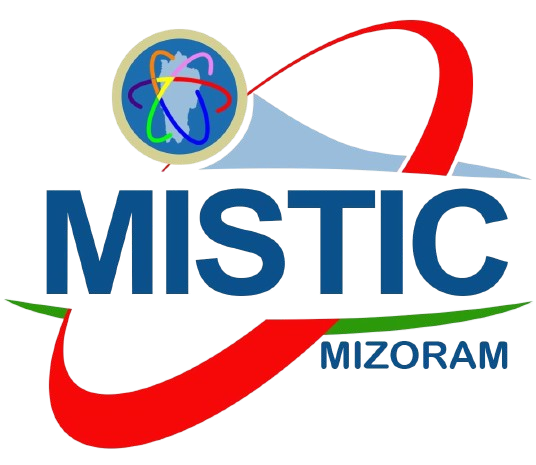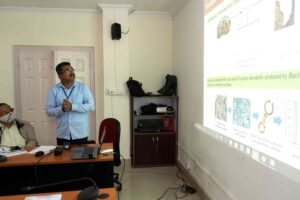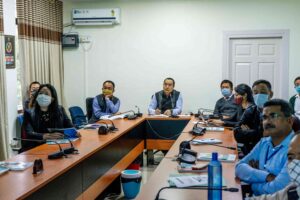MEETING ON SUSTAINABLE UTILISATION OF BIORESOURCES FOR SOCIO-ECONOMIC DEVELOPMENT OF MIZORAM
Home > Meetings > MEETING ON SUSTAINABLE UTILISATION OF BIORESOURCES FOR SOCIO-ECONOMIC DEVELOPMENT OF MIZORAM
An interactive meeting on ‘Sustainable Utilisation of Bioresources for Socio-economic Development of Mizoram’ was held on 29th May 2020 at the Conference Room of Directorate of Science & Technology, Mizoram New Capital Complex, Khatla, Aizawl, Mizoram. The meeting was organised by Mizoram Science, Technology & Innovation Council (MISTIC) and Institute of Bioresources and Sustainable Development (IBSD) under the Chairmanship of Dr. C. Vanlalramsanga, Secretary, Planning & Programme Implementation (Science & Technology) Department, Government of Mizoram
Welcome address by Dr. C. Vanlalramsanga, Secretary, Planning & Programme Implementation (Science & Technology) Department, Government of Mizoram.
In the inaugural session the Chairman extended a warm welcome to all the dignitaries and participants of the meeting. He expressed his gratitude to all the members for attending the meeting. The Chairman introduced Prof. Pulok K Mukherjee, Director, IBSD who joined the meeting from Kolkata via the web. He thanked Prof. Mukherjee for calling on a collaborative and outcome centric approach to promote sustainable bio-economy in northeast India. He stated that under the new leadership of Prof. Pulok K Mukherjee, who is already a global figure in ethnopharmacology, medicinal plants and drug development, IBSD and its partners will achieve greater heights in serving the northeast region. The chairman then gave an overview of the purpose of the meeting which is an initiative to work out the roadmap and timeline for scientific interventions to transform bioresources into bio-economy for the state of Mizoram.
Keynote address by Prof. Pulok K Mukherjee, Director, IBSD
Prof. Pulok K Mukherjee delivered a keynote address. He thanked the Secretary and the Department of Science & Technology for taking a prompt action in organising the meeting on bioresources of Mizoram with different stakeholders. He gave a brief introduction about IBSD and the different research verticals of the institution to catalyse the bio-economy of northeast India. Prof. Mukherjee spoke about the different initiatives of IBSD channeled through their different centres in northeast India – Imphal, Meghalaya, Mizoram and Sikkim. The focus areas of IBSD include biodiversity development, medicinal plant studies, indigenous knowledge, traditional foods and entrepreneurship promotion. He emphasised on the need to make research outcomes available to the local communities. He introduced the Phytopharmaceutical Mission of DBT which should also be initiated in Mizoram as IBSD is the leader of this program in northeast region. He then presented a roadmap and connectivity plan of IBSD in Mizoram.
Presentation by Dr. Kumarswamy Jayaram, Scientist E, IBSD Mizoram Centre
Dr. Kumarswamy Jayaram, Scientist E, IBSD Mizoram Centre then gave a short presentation focusing on the research activities in Mizoram. He gave a brief summary of their work on traditional knowledge inspired scientific validation by citing the examples of Saum (fermented pork) and Bekang (fermented soybeans).
Remarks by dignitaries and participants
Pu Liandawla, Member Secretary, Mizoram State Biodiversity Board and Principal Chief Conservator of Forests, Environment, Forest & Climate Change Department gave an insight into the work and regulatory authority vested in the Board. He stated that 894 Biodiversity Management Committee (BMC) have been set up in Mizoram representing different village councils. He acknowledged IBSD in their efforts and encouraged them to collaborate more with local researchers. He then expressed the willingness of the State Biodiversity Board to work with IBSD and step in when necessary.
Dr. K.Kire, Addl. Principal Chief Conservator of Forests, Environment, Forest & Climate Change Department, suggested that since the bioresources of the state are our most valuable resources it should be treasured and used as a tool for food security. He highlighted the importance of utilising our bioresources whilst keeping in mind the need for conservation and judicious use. He also pointed out the need to develop a convergence mechanism between various departments and agencies for better work implementation.
Representatives from various Government Departments, Academic Institutions and Entrepreneurs discussed the need for scientific interventions for value added development of bio-products. Main discussion points include formulation of food additives, food supplements, nutraceuticals from medicinal plants and use of food as medicines; nutrition profiling and labeling of traditional food and locally processed food items, production of bio-based fuel and fiber; and establishment of aromatic and medicinal plants community bioresources garden.


